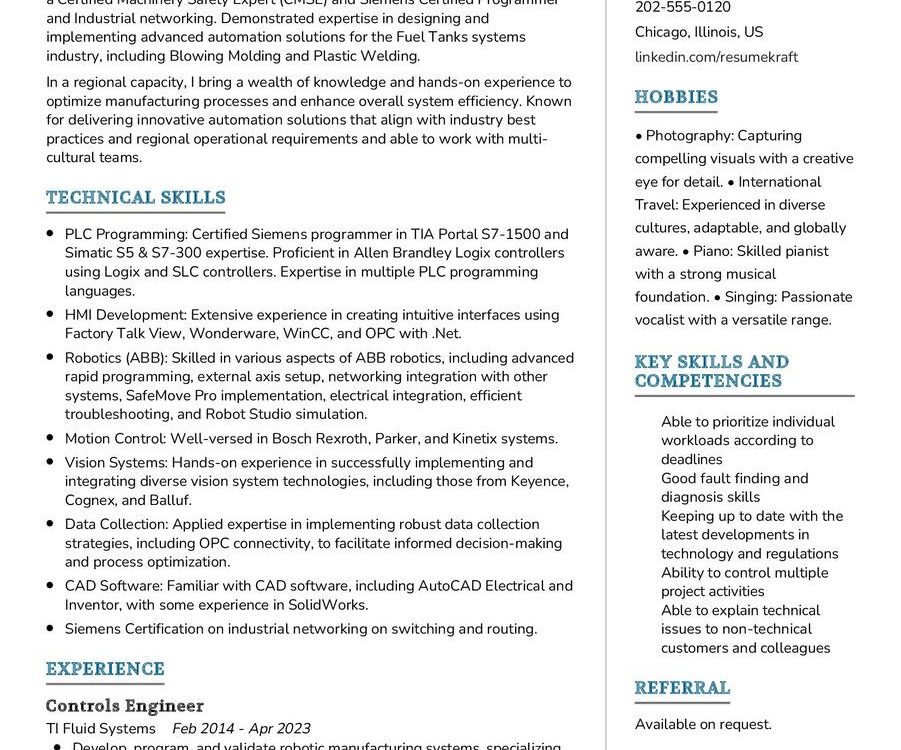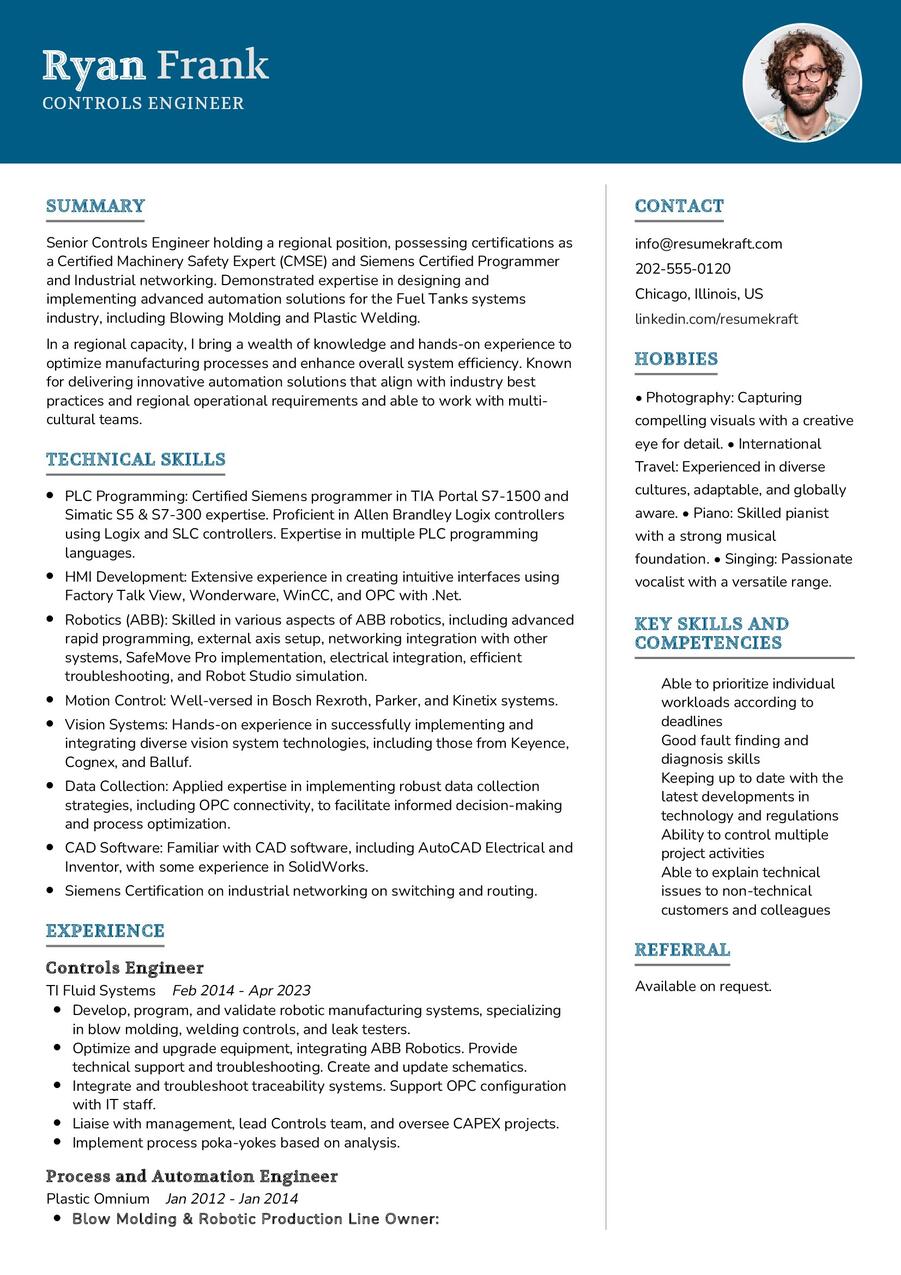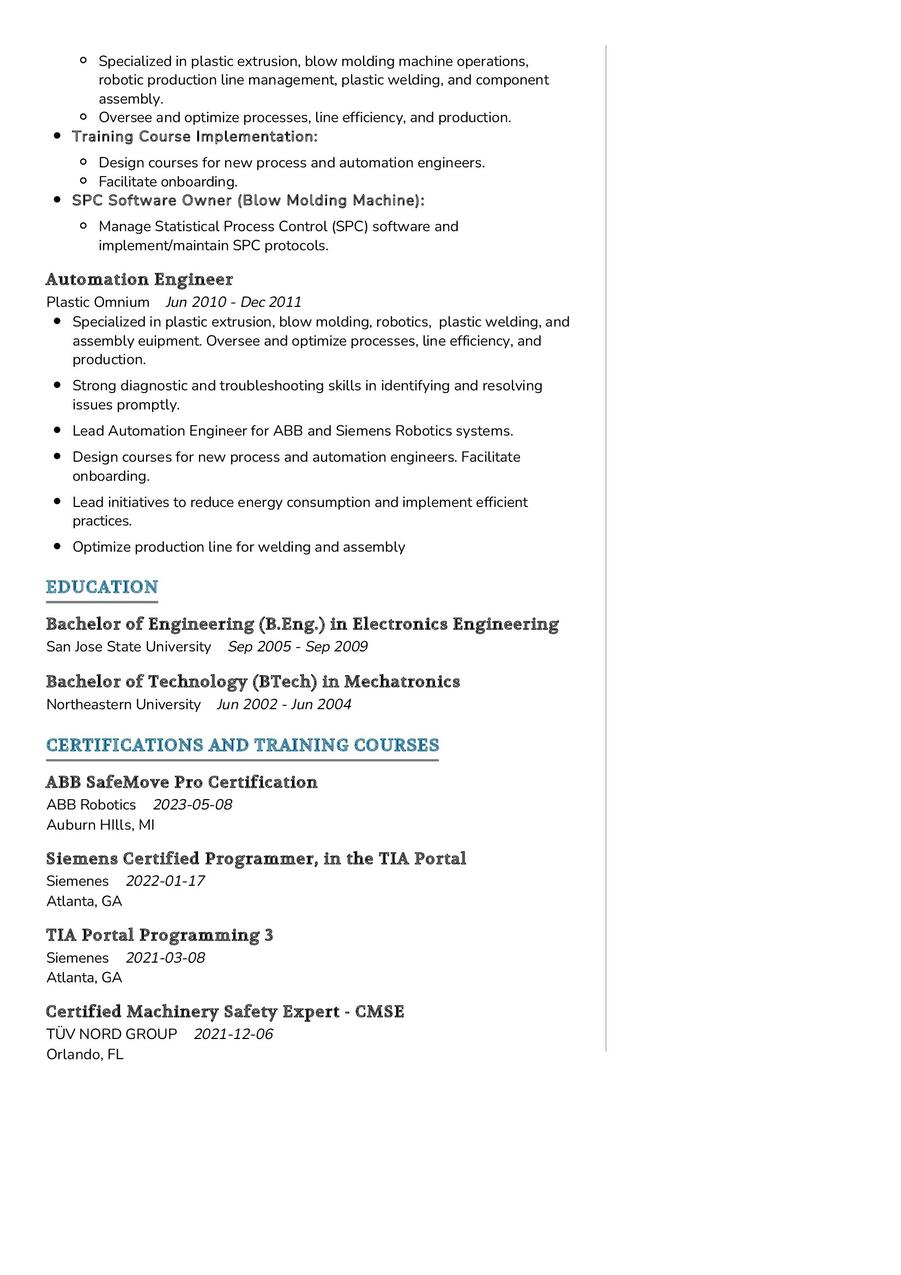Exploring the Role of a Controls Engineer
As industries continue to advance technologically, the demand for Controls Engineers has grown significantly. This pivotal role combines technical expertise with problem-solving skills to ensure seamless operation and efficiency in various automated systems. Let’s dive into the multifaceted role of a Controls Engineer, understanding the skills and responsibilities required to excel in this field.
Requirements for a Controls Engineer Position
Becoming a Controls Engineer involves meeting specific criteria and gaining hands-on experience. This journey is both challenging and rewarding, demanding continuous learning and skill development. Here are the prerequisites to embrace the role of a Controls Engineer:
- A Bachelor’s or Master’s degree in Electrical Engineering, Mechanical Engineering, or a related field, showcasing a solid foundation in the technical domain.
- Proficiency in PLC (Programmable Logic Controller) programming and HMI (Human-Machine Interface) design.
- Experience in designing and implementing control systems, demonstrating a trajectory of increasing responsibility.
- Strong analytical and problem-solving skills, essential for troubleshooting and optimizing control processes.
- Knowledge of industry standards and regulations, ensuring compliance in control system design.
- Effective communication skills to collaborate with cross-functional teams and convey technical information to non-technical stakeholders.
- Adaptability and resilience, crucial for addressing dynamic challenges in the field of controls engineering.
Securing additional certifications in automation technologies can enhance your profile and make you stand out in the competitive job market.
Responsibilities of a Controls Engineer
The role of a Controls Engineer is dynamic, involving a blend of technical skills and strategic thinking. Let’s explore the core responsibilities that define this position:
- Designing and implementing control systems to improve efficiency and reliability in manufacturing processes.
- Programming PLCs and developing HMI interfaces for seamless control system operation.
- Collaborating with electrical and mechanical engineers to integrate control systems into larger industrial processes.
- Conducting system testing and troubleshooting to identify and resolve issues in control processes.
- Ensuring compliance with industry standards and safety regulations in control system design and implementation.
- Providing training and support to end-users for efficient operation and maintenance of control systems.
- Staying updated on emerging technologies and industry trends to incorporate innovative solutions in control system design.
Each responsibility presents unique challenges, contributing to the continuous growth and development of a Controls Engineer.
Controls Engineer CV Writing Tips
Crafting a CV for a Controls Engineer position requires strategic presentation of your skills and experiences. Here are some tips to help you create a compelling CV:
- Highlight specific projects where you successfully designed and implemented control systems, showcasing measurable results.
- Detail your experience in PLC programming and HMI design, emphasizing your proficiency in automation technologies.
- Quantify your achievements by including metrics, demonstrating the impact of your work on improving system efficiency.
- List relevant certifications in automation and control technologies to validate your expertise.
- Customize your CV for the specific job role, aligning your skills and experiences with the job description.
Each tip contributes to a CV that effectively communicates your capabilities as a Controls Engineer.
Controls Engineer CV Summary Examples
Your CV summary is the opening statement of your professional journey, setting the tone for the reader. Here are some examples to inspire you:
- “Controls Engineer with a proven track record in PLC programming and HMI design, adept at optimizing industrial processes for maximum efficiency.”
- “Experienced Controls Engineer specializing in designing and implementing control systems, driving improvements in manufacturing operations.”
- “Results-driven Controls Engineer with a focus on compliance and safety, ensuring seamless integration of control systems in industrial settings.”
Each summary provides a snapshot of your expertise, guiding the reader to delve deeper into your CV.
Create a Robust Experience Section for Your Controls Engineer CV
Your experience section is the core of your CV, narrating the story of your career and accomplishments. Here are some examples to guide you:
- “Led the design and implementation of a PLC-based control system, resulting in a 15% increase in manufacturing efficiency.”
- “Collaborated with cross-functional teams to integrate control systems into a complex industrial process, ensuring seamless operation.”
- “Conducted training sessions for end-users, enhancing their understanding of control systems and promoting efficient maintenance practices.”
Each experience is a testament to your skills and contributions as a Controls Engineer.
Educational Background for Your Controls Engineer CV
Your educational journey forms the foundation of your career. Here’s how you can present your educational milestones:
- Master of Science in Electrical Engineering, XYZ University, 2018.
- Bachelor of Science in Mechanical Engineering, ABC University, 2015.
- Certified Automation Professional (CAP), demonstrating expertise in automation technologies, 2019.
Each educational qualification represents a step in your journey toward becoming a skilled Controls Engineer.
Controls Engineer Skills for Your CV
Your skill set is a valuable asset in your role as a Controls Engineer. Let’s list down the essential skills you should highlight in your CV:
Technical Skills:
- PLC Programming, showcasing proficiency in programmable logic controllers.
- HMI Design, demonstrating expertise in developing human-machine interfaces.
- Control System Integration, the ability to seamlessly integrate control systems into larger processes.
- Troubleshooting, adept at identifying and resolving issues in control processes.
- Compliance and Safety, ensuring control system designs adhere to industry standards and regulations.
Soft Skills:
- Effective Communication, the ability to convey technical information to non-technical stakeholders.
- Problem-Solving, the knack for addressing challenges in control system design and operation.
- Collaboration, the capacity to work with cross-functional teams to achieve common goals.
- Adaptability, the flexibility to navigate dynamic challenges in the field of controls engineering.
- Attention to Detail, ensuring precision in control system design and troubleshooting.
Each skill is a tool in your arsenal, contributing to your success as a Controls Engineer.
Common Mistakes to Avoid When Writing a Controls Engineer CV
As you craft your CV, it’s crucial to avoid common mistakes that can hinder your chances of landing your dream job. Here are some pitfalls to steer clear of:
- Avoid using generic language; instead, tailor your CV to highlight your unique fit for the Controls Engineer role.
- Focus on achievements rather than just listing job duties, providing depth to your narrative.
- Don’t overlook the importance of a cover letter; use it as an opportunity to connect with potential employers on a personal level.
- Avoid excessive technical jargon; aim for clarity to ensure your value is easily understood.
- Proofread your CV thoroughly to maintain a professional image and avoid any errors.
Avoiding these mistakes ensures that your CV is authentic and compelling, increasing your chances of success in the job market.
Key Takeaways for Your Controls Engineer CV
As we conclude this comprehensive guide, remember these key points when crafting your Controls Engineer CV:
- Highlight specific achievements in control system design, showcasing measurable results.
- Emphasize proficiency in PLC programming, HMI design, and other automation technologies.
- Showcase your strategic initiatives, demonstrating your visionary approach to controls engineering.
- Include a section on continuous learning, showcasing relevant certifications and courses undertaken.
Finally, feel free to utilize resources like AI CV Builder, CV Design, CV Samples, CV Examples, CV Skills, CV Help, CV Synonyms, and Job Responsibilities to create a standout application and prepare for the Controls Engineer job interview.
Armed with these insights and tips, you are now ready to craft a CV that is a true reflection of your journey, your skills, and your aspirations. Remember, your CV is not just a document; it is a canvas where you paint your career story, a story of growth, learning, and success. Best of luck!



